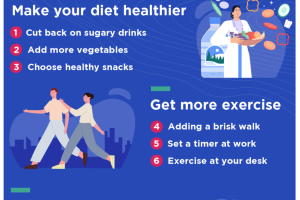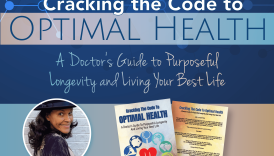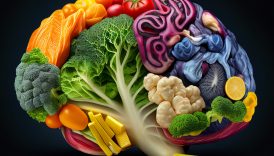Transform Your Life with Healthy Living Strategies for Lasting Relief

Importance of Healthy Living
In today’s fast-paced world, the importance of healthy living cannot be overstated. It’s often easy to overlook our well-being amidst daily responsibilities, but prioritizing health is crucial. Adopting a healthy lifestyle not only enhances physical well-being but also profoundly impacts mental and emotional health. For instance, consider John, a busy professional. After experiencing a burnout, he decided to make small changes, like meal prepping and scheduling workouts. This shift led to increased energy levels and improved focus, demonstrating that healthy living is fundamental to thriving in both personal and professional life.
- Transform Your Life with Healthy Living Strategies for Lasting Relief
- Importance of Healthy Living
- Benefits of Lasting Relief
- Nutrition
- Balanced Diet
- Superfoods to Include
- Physical Activity
- Exercise Routine
- Importance of Movement
- Stress Management
- Techniques to Reduce Stress
- Mindfulness Practices
- Quality Sleep
- Importance of Sleep
- Tips for Better Sleep
- Hydration
- Benefits of Drinking Water
- Hydration Tips
- Mental Health
- Importance of Mental Well-being
- Strategies for Mental Clarity
- Social Connections
- Building Supportive Relationships
- Engaging with Community
- Regular Health Check-ups
- Importance of Preventive Care
- Recommended Screenings
- Creating Healthy Habits
- Habit Formation
- Techniques for Sustainable Change
Benefits of Lasting Relief
Investing in a healthy lifestyle yields benefits that go beyond immediate gratification. Achieving lasting relief from stress, anxiety, and fatigue is not just about quick fixes; it’s about creating sustainable habits that foster long-term wellness. Key benefits include:
- Enhanced Energy Levels: A balanced diet and regular exercise can boost natural vitality.
- Improved Mood: Healthy habits can release endorphins, promoting a sense of happiness and well-being.
- Long-Term Health: Consistent self-care lowers the risk of chronic diseases.
Ultimately, embracing healthy living leads to a more fulfilling and vibrant life!
Nutrition
Balanced Diet
Transitioning toward healthy living starts with understanding the importance of a balanced diet. A balanced diet is all about consuming the right proportions of macronutrients—carbohydrates, proteins, and fats—while incorporating essential vitamins and minerals. For example, Sarah, a mother of two, noticed a change in her family’s energy levels when she revamped their diet. By including more fruits, vegetables, and whole grains, meals became not only varied but also nutritious. This shift led to less fatigue and a boost in her kids’ focus at school! Essential components of a balanced diet include:
- Fruits and Vegetables: Aim for a colorful plate to provide a range of nutrients.
- Whole Grains: Switch white rice and bread for brown rice and whole grain options.
- Lean Proteins: Include sources like chicken, fish, quinoa, and legumes.
Superfoods to Include
Incorporating superfoods into your diet can further elevate your nutrition. Superfoods are nutrient-dense and can provide numerous health benefits. Consider adding these to your meals:
- Blueberries: High in antioxidants, they support brain health.
- Kale: Packed with vitamins A, C, and K, it’s a fantastic leafy green.
- Quinoa: A complete protein source, perfect for vegans and vegetarians.
- Chia Seeds: These tiny seeds are great for omega-3s and fiber.
Each meal becomes an opportunity to nourish and heal your body, paving the way for lasting wellness in your daily life!
Physical Activity
Exercise Routine
Building on the foundation of nutrition, physical activity plays a pivotal role in achieving overall wellness. Crafting a personalized exercise routine can seem daunting, but it doesn’t have to be! Take Mark, an office worker who struggled with sedentary habits. To counteract this, he started small, dedicating just 30 minutes a day to activities he enjoyed, like cycling and yoga. Over time, this commitment transformed into a structured routine that included:
- Strength Training: Two days a week focusing on bodyweight exercises.
- Cardiovascular Workouts: Three days a week, mixing running and swimming.
- Flexibility Practices: Incorporating yoga or stretching exercises to enhance mobility.
Importance of Movement
Movement is essential beyond just burning calories. It helps maintain a healthy weight, boosts mood, and increases overall energy levels. For Jennifer, a busy student, incorporating quick 10-minute movements between study sessions resulted in improved concentration and reduced anxiety. Key benefits of staying active include:
- Enhanced Mental Clarity: Regular physical activity can improve focus and cognitive function.
- Stress Relief: Exercise releases endorphins, promoting happiness and reducing stress levels.
Ultimately, embracing physical activity isn’t just about looking good; it’s about feeling your best both physically and mentally!
Stress Management
Techniques to Reduce Stress
As physical activity boosts mood and energy, it’s equally important to manage stress for overall well-being. When everyday pressures pile up, stress can affect both mental and physical health. Luckily, implementing effective stress-reduction techniques can make a profound difference. For instance, Emily, a teacher often overwhelmed by her responsibilities, found relief in time management and self-care rituals. Techniques that helped her include:
- Prioritization: Creating daily to-do lists to tackle tasks step-by-step.
- Deep Breathing: Taking five minutes to practice controlled breathing whenever anxiety arises.
- Physical Activity: Incorporating walks during breaks to clear her mind.
Mindfulness Practices
In addition to these techniques, embracing mindfulness practices can transform how one handles stress. Mindfulness encourages staying present and appreciating the moment, reducing anxiety about the past or future. For Alex, an avid runner, including mindfulness in his workouts yielded remarkable results. By focusing on his breathing and surroundings during runs, he felt a sense of peace and clarity. Some popular mindfulness practices include:
- Meditation: Spend a few minutes daily to center thoughts and relax the mind.
- Journaling: Writing down thoughts can help process emotions and reduce stress levels.
- Yoga: Combining movement with focused breathing fosters relaxation and mental clarity.
Ultimately, mastering stress management techniques and mindfulness can enhance the quality of life, leading to a more centered and peaceful existence!
Quality Sleep
Importance of Sleep
Just as managing stress is vital for well-being, quality sleep is the foundation of a healthy lifestyle. Sleep affects nearly every aspect of physical and mental health, from mood regulation to cognitive function. For instance, Rachel, a college student, discovered that not getting enough sleep left her feeling irritable and unfocused. Once she prioritized rest, her grades improved, and her overall mood stabilized. The importance of sleep cannot be overstated:
- Physical Health: Adequate sleep supports the immune system and helps the body repair itself.
- Mental Clarity: A well-rested mind enhances focus, decision-making, and creativity.
- Emotional Balance: Quality sleep contributes to better emotional regulation, reducing anxiety and stress.
Tips for Better Sleep
To ensure a good night’s sleep, incorporating healthy habits is essential. Here are some practical tips to improve sleep quality:
- Establish a Sleep Routine: Going to bed and waking up at the same time daily strengthens your body’s internal clock.
- Create a Restful Environment: Limit noise and light; consider blackout curtains and white noise machines.
- Limit Screen Time: Reducing exposure to screens an hour before bed helps your mind unwind.
- Mindful Evening Rituals: Engage in calming activities, such as reading or gentle yoga, to prepare for restful sleep.
By implementing these strategies, individuals can transform their sleep habits, fostering deeper, more restorative sleep, and enhancing overall health in the process!
Hydration
Benefits of Drinking Water
Following the emphasis on quality sleep, another crucial aspect of healthy living is proper hydration. Drinking enough water is often overlooked, yet it plays a vital role in maintaining optimal health. Not only does water regulate body temperature, but it also aids digestion and supports overall cellular function. For instance, when Michael, a busy graphic designer, recognized he was often fatigued, he started tracking his water intake. He quickly noticed improvements in his energy levels and focus throughout the day. Some key benefits of drinking water include:
- Enhanced Energy Levels: Staying hydrated helps combat fatigue and increases alertness.
- Improved Digestion: Water aids in breaking down food, promoting better nutrient absorption.
- Better Skin Health: Hydration can lead to a more radiant and healthy complexion.
Hydration Tips
To harness the benefits of hydration, implementing a few practical tips can be immensely helpful:
- Carry a Water Bottle: Keep a reusable bottle handy to sip throughout the day, making it easier to track intake.
- Set Reminders: Use smartphone apps or alarms to prompt regular drinking breaks.
- Flavor Your Water: Add fruits, herbs, or cucumber to create refreshing, flavorful options that encourage consumption.
- Eat Water-Rich Foods: Incorporate fruits and vegetables like cucumbers, oranges, and watermelon, which have high water content.
By making hydration a daily priority, individuals can enhance their well-being and overall health, contributing to a more vibrant life!
Mental Health
Importance of Mental Well-being
As hydration plays a crucial role in physical health, mental well-being is equally fundamental to a fulfilling life. Prioritizing mental health can significantly impact one’s overall quality of life, influencing everything from relationships to productivity. For example, Lisa, a marketing executive, found herself overwhelmed with work and personal obligations. By focusing on her mental health, she discovered the importance of setting boundaries and taking time for herself, which led to a more balanced and happier life. The importance of mental well-being cannot be overstated:
- Emotional Resilience: A strong mental state helps manage stress and overcome challenges more effectively.
- Improved Relationships: Positive mental health fosters better communication and connection with others.
- Enhanced Focus: Mental clarity allows for improved decision-making and productivity in daily tasks.
Strategies for Mental Clarity
To enhance mental clarity, several effective strategies can be implemented:
- Practice Gratitude: Spend a few moments each day reflecting on things you appreciate—this simple practice can shift your mindset positively.
- Limit Multitasking: Focusing on one task at a time can lead to better outcomes and reduced stress.
- Engage in Creative Activities: Pursuing hobbies like painting or writing can help clear the mind and spark joy.
- Seek Professional Support: Sometimes discussing challenges with a therapist can provide valuable insights and coping strategies.
By prioritizing mental health and adopting these strategies, individuals can nurture their minds, fostering resilience and clarity for a more vibrant and satisfying life!
Social Connections
Building Supportive Relationships
As mental health flourishes, another critical component of well-being is nurturing social connections. Building supportive relationships contributes significantly to emotional resilience and overall happiness. For instance, David, a new retiree, realized he was feeling isolated after leaving the workforce. By making an effort to reconnect with old friends and make new ones, he discovered a profound sense of belonging. Key elements for cultivating supportive relationships include:
- Open Communication: Being transparent about feelings fosters deeper connections.
- Active Listening: Taking the time to understand others’ perspectives strengthens bonds.
- Regular Check-ins: Making a simple phone call or sending a message can keep friendships alive.
Engaging with Community
Engaging with the community can further enhance social well-being. Participating in local events or volunteering allows individuals to meet like-minded people while giving back. Consider Sarah, who joined a local book club and discovered not only a passion for reading but also a network of friends who shared her interests. Benefits of community engagement include:
- Shared Experiences: Creating memories with others contributes to a sense of belonging.
- Increased Happiness: Helping others boosts mood and fosters gratitude.
- Broadened Perspectives: Meeting diverse individuals leads to personal growth and understanding.
By prioritizing social connections and community involvement, individuals can cultivate a rich support network, enhancing both emotional well-being and quality of life!
Regular Health Check-ups
Importance of Preventive Care
In addition to fostering social connections, regular health check-ups play a vital role in maintaining overall well-being. Preventive care focuses on identifying health issues before they escalate, allowing for timely intervention. For example, Jenna, a health-conscious individual, makes it a point to schedule annual check-ups. During her last visit, her doctor detected high cholesterol levels early on, enabling her to make dietary changes before it became a serious problem. The importance of preventive care can be highlighted by:
- Early Detection: Regular screenings can catch issues like high blood pressure or diabetes before symptoms manifest.
- Cost Savings: Addressing potential problems early can save on treatment costs down the road.
- Peace of Mind: Knowing that you’re on top of your health can reduce anxiety and promote proactive habits.
Recommended Screenings
To maximize the benefits of regular check-ups, certain screenings are essential, depending on age and risk factors:
- Blood Pressure Checks: At least annually, starting in adulthood.
- Cholesterol Screenings: Every 4-6 years for adults over 20; more frequently if at risk.
- Screening for Diabetes: Every 3 years for adults aged 45 and older, or sooner if overweight.
- Cancer Screenings: Mammograms for women over 40 and colonoscopies for those over 45, based on personal and family medical history.
By prioritizing regular health check-ups and preventive care, individuals can proactively manage their health, ensuring a longer, healthier life filled with vitality!
Creating Healthy Habits
Habit Formation
While maintaining regular health check-ups is essential for well-being, forming healthy habits is equally vital for long-term health. Habit formation is the process through which behaviors become automatic, allowing individuals to incorporate healthier practices seamlessly into their daily lives. For instance, Mark, a self-proclaimed night owl, started waking up just 15 minutes earlier every day to fit in a morning stretch routine. Over a few weeks, this small change evolved into a more substantial morning exercise regimen. Key steps in habit formation include:
- Start Small: Begin with manageable changes that are less overwhelming.
- Be Consistent: Try to perform the new habit at the same time or in the same context daily.
- Track Progress: Use journals or apps to monitor and celebrate progress, reinforcing the behavior.
Techniques for Sustainable Change
To ensure that healthy habits stick, employing specific techniques can help:
- Set Clear Goals: Define what you want to achieve with specific, measurable targets, like “I will drink three liters of water daily.”
- Use Reminders: Phone alerts or sticky notes can prompt you to continue with your new habits.
- Find Accountability Partners: Share your goals with friends or family who can encourage you along the way.
- Practice Self-Compassion: Understand that slip-ups are part of the journey—focus on getting back on track rather than dwelling on setbacks.
By focusing on habit formation and employing these techniques, individuals will be better equipped to create sustainable changes that contribute to a healthier, more fulfilling lifestyle!





